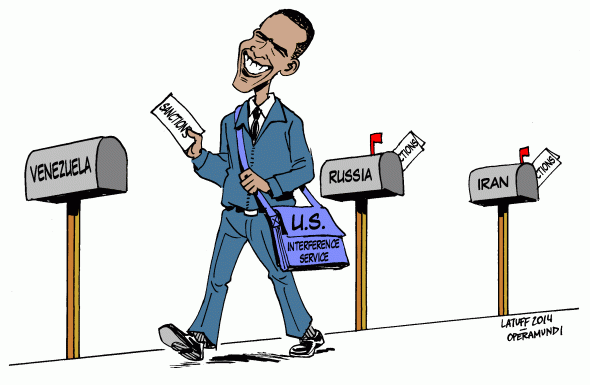Chavistas Denied Entry, Assets Frozen in United States

The wait is over for the US Congress to enact targeted sanctions against the Chavista regime in Venezuela. On Monday, senators passed the Venezuela Defense of Human Rights and Civil Society Act of 2014, after being the bottleneck for many months, and then on Wednesday at 6 p.m. EST the House followed suit and approved the bill with a unanimous voice vote.
Proponents of the measure emphasize the targeted element, that they do not wish to impose harm on people stuck in Venezuela. Rather, the measure only seeks to zero in on Chavista officials responsible for the deaths and mass incarceration that occurred during the crackdown on protesters earlier this year, as widely condemned by human-rights organizations.
The text itself (S.2142) delineates the goal for Venezuela to be “peace and representative democracy as defined by the Inter-American Democratic Charter of the Organization of American States.” The teeth of the legislation mandates that established culprits of human-rights violations be subject to asset freezes and banned from entry into the United States, with a sunset provision of December 31, 2016.
The legislation does not, however, include any form of immigration amnesty or special exception for Venezuelans. That sought-after element was perhaps too sensitive for implementation, given the president’s recent and controversial decision to not enforce some deportations on illegal immigrants.
Still, the measure has received considerable support from Venezuelan exiles and the Center for Security Policy — a neoconservative-leaning policy institute based in Washington, DC. It also comes on the heels of Freedom House’s call for the Chavista regime to release political prisoners such as Leopoldo López and Daniel Ceballos, and to withdraw charges against María Corina Machado.
Robert Herman, vice president for regional programs for the watchdog organization, says their imprisonment is “is a clear violation of these individuals’ constitutional rights and confirms the political motivations behind these prolonged detentions… Rather than reconsider its authoritarian tactics in the face of such criticism, the government has accelerated its assault on opposition leaders, most recently through ludicrous conspiracy charges against former National Assembly member Maria Corina Machado.”

Representative Ileana Ros-Lehtinen (R-FL) takes questions from reporters on the crisis in Venezuela. (house.gov)
“Congress has acted in a unified and bipartisan manner,” says Ros-Lehtinen, “to send a clear and unequivocal message that the we will not continue [to] tolerate impunity of violations of human rights in Venezuela and we support the calls of democracy and freedom by the people of Venezuela.” Her press statement also asserts the need for vigorous enforcement via the State Department.
Congressman Diaz-Balart explains that “As students and other activists peacefully protest against oppressive acts, food shortages, soaring crime rates, more than 4,000 people have been arrested, 1,000 injured, and dozens killed.” He believes the crackdown’s objective, contrary to “bogus charges,” has been to silence any viable opposition, whom he describes as “courageous democracy leaders.”
As reported by TeleSUR, one of Venezuela’s state-sponsored media outlets, socialist President Nicolás Maduro has denounced these actions and allegations as “imperialist” and says the move will worsen already cold relations between the two nations. The Chavista outlet declares the accusations of human-rights violations to be arbitrary and maintains that the protests were not peaceful.
No comments:
Post a Comment